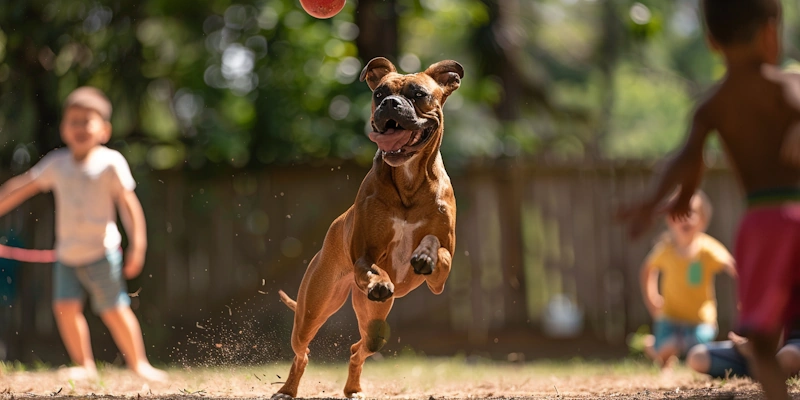The Boxer dog breed is known for its striking appearance, boundless energy, and affectionate nature. These loyal and intelligent dogs make wonderful family pets and are highly regarded for their versatility in various roles, from guardians to therapy dogs. This blog post will provide an in-depth look at the Boxer, exploring their history, characteristics, care needs, and why they might be the perfect addition to your home.
History and Origins
The Boxer breed originated in Germany in the late 19th century. They were developed by crossing the Bullenbeisser, a now-extinct German bulldog-type dog, with other breeds such as the English Bulldog and possibly the Great Dane. The result was a powerful and agile dog used for hunting large game like boar and deer.
The breed’s name likely comes from their tendency to "box" with their front paws during play and fighting. Boxers gained popularity in the United States and were officially recognized by the American Kennel Club (AKC) in 1904. Since then, they have become one of the most popular breeds, known for their versatility and friendly disposition.
Characteristics and Temperament

Boxers are medium to large-sized dogs with a strong, muscular build. Males typically weigh between 65 to 80 pounds and stand 23 to 25 inches tall at the shoulder, while females weigh between 50 to 65 pounds and stand 21.5 to 23.5 inches tall. They have a short, smooth coat that comes in fawn, brindle, or white, often with distinctive white markings.
The Boxer’s temperament is characterized by their playful, energetic, and affectionate nature. They are known for being loyal and protective of their families, making them excellent watchdogs. Boxers are also highly social and enjoy being around people and other dogs. They are particularly good with children, displaying a gentle and patient demeanor.
Intelligence and Trainability
Boxers are intelligent dogs that are eager to learn, making them highly trainable. They excel in obedience training, agility, and various dog sports. However, their energetic and sometimes stubborn nature requires a firm and consistent approach to training.
Positive reinforcement techniques, such as treats, praise, and play, work particularly well with Boxers. Early socialization and consistent training are essential to help them develop good manners and adapt to various situations. Due to their high energy levels, Boxers benefit from ongoing training and mental stimulation throughout their lives.
Exercise and Activity Needs

Boxers are active dogs that require regular exercise to stay healthy and happy. They thrive on physical activity and mental stimulation. Here are some ways to meet their exercise needs:
- Daily Walks and Runs: Aim for at least an hour of vigorous exercise each day, including walks, runs, and playtime. Boxers enjoy activities such as jogging, hiking, and playing fetch.
- Interactive Play: Engage your Boxer with interactive toys and games that challenge their mind and body, such as tug-of-war and puzzle toys.
- Training and Work: Boxers enjoy having a job to do. Incorporate training sessions and tasks into their daily routine to keep their minds sharp.
- Dog Sports: Participate in dog sports such as agility, obedience, and tracking to provide additional physical and mental stimulation.
Without adequate exercise, the Boxer dog can become bored and develop behavioral issues such as excessive barking, digging, or chewing.
Health and Lifespan
Boxers are generally healthy dogs with a lifespan of 10 to 12 years. However, like all breeds, they are prone to certain health issues. Some common health concerns for Boxers include:
- Hip Dysplasia: A genetic condition where the hip joint doesn’t fit properly, causing pain and arthritis.
- Heart Conditions: Boxers can be prone to heart issues such as aortic stenosis and cardiomyopathy.
- Cancer: Boxers have a higher risk of certain cancers, including lymphoma and mast cell tumors.
- Bloat (Gastric Dilatation-Volvulus): A life-threatening condition where the stomach twists and traps gas.
- Allergies: Boxers can suffer from skin allergies that cause itching and discomfort.
The Boxer dog requires regular veterinary check-ups, a balanced diet, and maintaining a healthy weight can help manage these health issues. It’s also important to choose a reputable breeder who tests their breeding dogs for common genetic conditions.
Grooming and Maintenance
Boxers have a short, smooth coat that requires minimal grooming. However, regular maintenance is still important to keep them looking their best and to prevent health issues.
- Brushing: Brush your Boxer’s coat once a week to remove loose hair and keep their coat shiny.
- Bathing: Bathe your dog as needed, typically every few months, using a gentle dog shampoo.
- Ear Cleaning: Regularly check and clean your Boxer’s ears to prevent infections.
- Nail Trimming: Trim your dog’s nails regularly to prevent overgrowth and discomfort.
- Dental Care: Brush your dog’s teeth several times a week to maintain good oral health.
Is a Boxer Right for You?
Boxers are excellent companions for active individuals and families who can provide regular exercise, mental stimulation, and consistent training. They are best suited for homes with a yard where they can run and play. Boxers require an owner who is committed to meeting their high energy levels and providing plenty of opportunities for physical and mental activity.
Their friendly and affectionate nature makes them suitable for people who enjoy spending time with their pets and can include them in various activities. Potential owners should be aware of the breed’s health risks and grooming needs and be prepared to invest time and effort into their care and training.
Conclusion
The Boxer’s combination of intelligence, energy, and affectionate temperament makes them a beloved breed worldwide. Whether you’re looking for a loyal family pet, a competitive sport dog, or a loving companion, the Boxer is an excellent choice. By understanding their needs and characteristics, you can ensure a happy and fulfilling life for both you and your Boxer. With proper care, training, and attention, this remarkable breed can be a wonderful addition to any home.